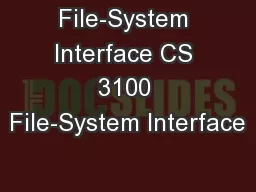PPT-Speculative Execution In Distributed File System
Author : debby-jeon | Published Date : 2016-07-17
and External Synchrony Edmund BNightingale Kaushik Veeraraghavan Peter Chen Jason Flinn Presented by Han Wang Slides based on the SOSP and OSDI presentations
Presentation Embed Code
Download Presentation
Download Presentation The PPT/PDF document "Speculative Execution In Distributed Fil..." is the property of its rightful owner. Permission is granted to download and print the materials on this website for personal, non-commercial use only, and to display it on your personal computer provided you do not modify the materials and that you retain all copyright notices contained in the materials. By downloading content from our website, you accept the terms of this agreement.
Speculative Execution In Distributed File System: Transcript
Download Rules Of Document
"Speculative Execution In Distributed File System"The content belongs to its owner. You may download and print it for personal use, without modification, and keep all copyright notices. By downloading, you agree to these terms.
Related Documents














